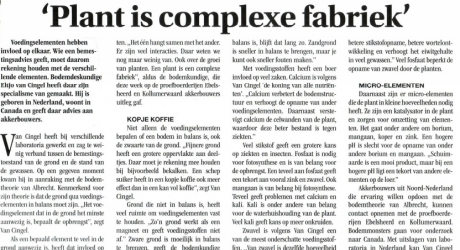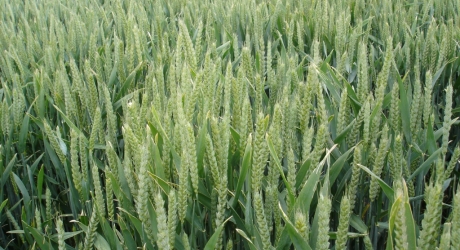
Nutrients affect each other. Therefore, when someone gives fertilizer recommendations, they have to take that into account. Soil fertility consultant Eltjo van Cingel has made this his specialty. He was born in the Netherlands, lives in Canada where he offers consulting services to farmers.
Van Cingel has worked with several labs but did not see enough correlation between soil analysis and crop yield. In 1993 he came across the Albrecht soil analysis system. The soil nutrients have to be in balance. According to van Cingel “the nutrient most deficient will determine the yield.”
When a certain soil nutrient is in excess, it will affect the availability of other nutrients. There are many possible interactions. There is a lot we still have to learn about role of nutrients, interactions and the physiology of plants. The plant is a complex factory according to the soil expert.
The amount of soil nutrients determines if a soil is in balance or not but the soil texture also has to be taken into consideration. “A heavier soil has a larger surface area per gram of soil. You have to take this into account when applying lime. A scoop of sugar has a larger effect in a cup of coffee compared to a pot of coffee.,” according to van Cingel.
Soil that is not in balance could have a lot of room to hold nutrients. The soil works like a magnet and may not release nutrients that easily. “A heavy soil is more difficult to bring in balance” according to Van Cingel “But once a heavy soil is in balance it remains for a longer period of time. Sandy type soils can be balanced more quickly but mistakes are easier to make compared to heavy soils.”
A farmer can influence many aspects with nutrients. According to Van Cingel “ calcium is king of all nutrients. Calcium improves soil structure and enhances the uptake of other nutrients. Calcium also strengthens cell walls which increases the plants ability to fight off diseases.”
Too much nitrogen increases the plants susceptibility to disease and insects. Phosphate is important for photosynthesis and crop yield. Too much phosphate however, causes a deficiency of zinc and sulfur. Manganese is also important in photosynthesis. Potassium is needed to properly manage the moisture content of the plant. Too much potassium increases the chance of weeds.
According to Van Cingel, sulfur is one of the most under estimated nutrients. Sulfur is needed in about the same quantity as phosphate. Sulfur enhances the uptake of nitrogen, root growth and protein content in many crops.” Too much phosphate reduces the uptake of sulfur by plants.
Micronutrients are also required by plants but in smaller quantities. They are the catalyst in many processes in the plant. We are talking about boron, manganese, copper and zinc. A high soil pH blocks the uptake of these micronutrients. “Sugarbeet lime is a nice product but when applied on a high pH soil, it will reduce the uptake of other nutrients.”
Farmers in The Netherlands who would like to learn more about the Albrecht system can get in touch with Johan Schuitema. Soil samples are send to the USA for analysis. Van Cingel cannot interpret soil reports from Dutch labs.

Attachments



